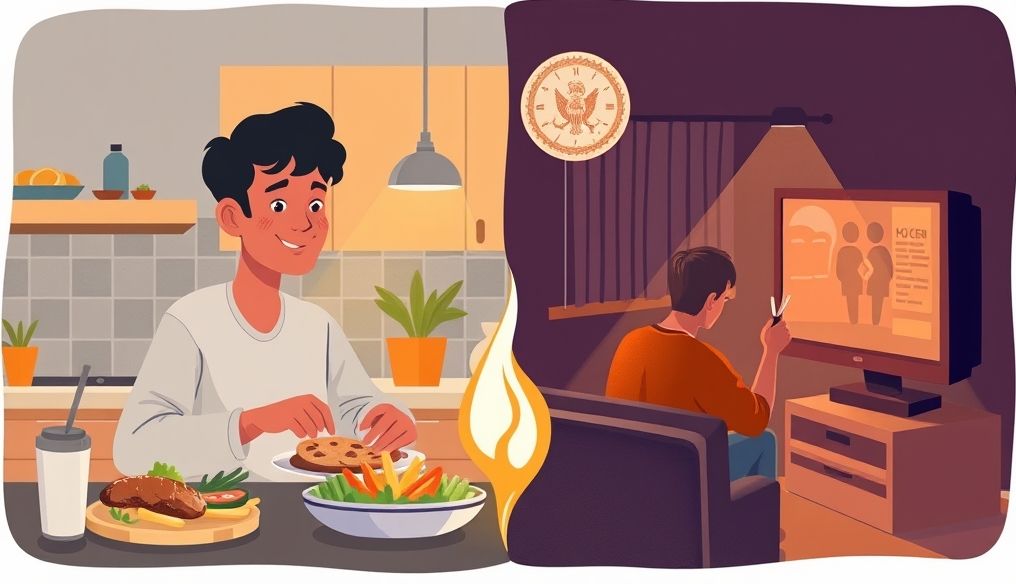Does Eating Late at Night Really Cause Weight Gain?
Eating late at night has long been associated with weight gain, and this belief has become so widespread that it is considered an accepted truth. But, is this entirely correct? Does simply eating after 8 PM or right before bed inevitably lead to weight gain? The answer is not so simple; it involves a combination of factors, not just timing.
What Does Research Say?
Several studies suggest a link between late-night eating and weight gain, but they don't necessarily prove that timing is the sole cause. People who eat their meals late at night are often more likely to make unhealthy food choices, such as processed foods, fast food, and snacks high in calories and saturated fats. Additionally, they may have irregular sleep patterns, which in turn can affect metabolism and appetite regulation.
Factors Influencing Weight Gain
To understand the picture more clearly, let's review the main factors that influence weight gain and how they can interact with the habit of late-night eating:
1. Total Calorie Intake
This is the most important factor of all. If you consume more calories than you burn throughout the day, you will gain weight, regardless of when you eat. If you eat a large meal late at night in addition to your usual meals during the day, you are more likely to exceed your allowed calorie limit.
2. Food Quality
As mentioned earlier, late-night meals are often unhealthy. Foods high in fat, sugar, and salt not only contribute to increased calorie intake but can also negatively affect blood sugar levels and increase the risk of cardiovascular diseases.
3. Sleep
Good sleep is essential for healthy metabolism and appetite regulation. Lack of sleep can increase levels of ghrelin (the hunger hormone) and decrease levels of leptin (the satiety hormone), leading to increased cravings for food, especially high-calorie foods.
4. Physical Activity
If you don't exercise regularly, you will burn fewer calories, increasing the chances of fat storage. People who eat their meals late at night are often less physically active during that time of day.
5. Metabolism
Metabolism plays a role in how the body burns calories. Metabolic rate varies from person to person and is affected by factors such as age, gender, muscle mass, and genetics. Some people may simply have a natural tendency to gain weight more easily than others.
Does the Effect of Late-Night Eating Differ for Everyone?
Yes, it does. Some people may be more susceptible to the effects of late-night eating than others. For example:
- People with sleep disorders: They may already have problems with appetite regulation and metabolism.
- People who work night shifts: They may experience disruption in their circadian rhythm, affecting eating and sleeping patterns.
- People with certain medical conditions: Such as diabetes, may need to be cautious about meal timing to maintain stable blood sugar levels.
Tips for Healthy Eating at Night
If you are accustomed to eating late at night, or if you are forced to do so due to work conditions or other reasons, here are some tips that can help you reduce its impact on your weight and health:
1. Plan Your Meals in Advance
Instead of relying on fast food or unhealthy snacks, try planning your meals in advance and preparing them with you. Choose healthy foods rich in protein and fiber, such as vegetables, fruits, low-fat yogurt, and grilled chicken.
2. Reduce Portion Sizes
Eat small, balanced meals instead of one large meal. This will help you control your calorie intake and prevent feeling overly full before bed.
3. Avoid Processed Foods and Sugary Drinks
Stay away from fast food, sweets, soda, and sweetened juices. These foods and drinks are high in empty calories and provide no nutritional value.
4. Drink Water
We often confuse thirst with hunger. Drink a glass of water before eating to make sure you are not just thirsty.
5. Don't Eat in Front of the TV or Computer
When you are distracted, it's easy to eat more than you need. Focus on your food and enjoy it.
6. Try to Eat Dinner at Least Two Hours Before Bed
This gives your body enough time to digest the food before sleeping.
7. Consult a Nutritionist
If you are concerned about your weight or have any questions about nutrition, consult a nutritionist for personalized advice.
Case Study: A Real-Life Example
Let's imagine a person who works night shifts. Due to the nature of their work, they eat their main dinner meal at 11 PM. Instead of eating an unhealthy fast-food meal, this person prepares a healthy meal consisting of grilled chicken breast, a green salad, and some brown rice. They also make sure to drink water regularly and avoid sugary drinks. Additionally, they try to exercise regularly during their days off. Thanks to these healthy habits, this person is able to maintain a healthy weight despite eating late at night.
Conclusion
Eating late at night is not necessarily a direct cause of weight gain. The most important factor is the total calorie intake and food quality. If you eat healthy meals in moderate amounts and maintain an active lifestyle, the timing of eating is unlikely to significantly affect your weight. However, you should be aware of other factors that can affect your weight, such as sleep and metabolism, and take steps to minimize their negative impact.




